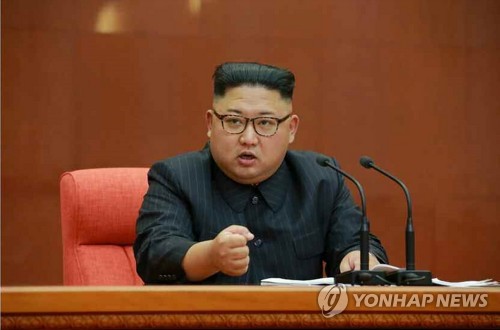North Korea is set to hold a plenary meeting of its ruling party Friday, drawing keen attention over whether it will send a message of denuclearization ahead of its summits with South Korea and the United States.
The central committee of the Workers' Party of Korea (WPK) is scheduled to hold the meeting to discuss policy issues of "a new stage" in a historic period, according to the Korean Central News Agency.
In the WPK's plenary meeting, the central committee's members and alternate members discuss and approve key party policy lines and personnel reshuffles.
The timing of the session draws attention as North Korean leader Kim Jong-un is set to meet with the leaders of South Korea and the U.S. Whether Pyongyang will unveil a potential shift in its stance toward its nuclear program is also being watched.
Kim will sit down with President Moon Jae-in next Friday, followed by a summit with U.S. President Donald Trump probably in May or early June. North Korea's denuclearization will top the agenda for those meetings.

After visiting North Korea last month, South Korean envoys told Trump that Kim expressed a willingness for denuclearization.
The North reportedly suggested a need for phased and synchronous measures for denuclearization, but the U.S. has called on the North to dismantle its nuclear program in a complete, irreversible and verifiable manner.
Experts said that the North used WPK plenary meetings to defend its pursuit of nuclear programs.
Kim's signature policy of seeking both nuclear and economic development, commonly known as the "byongjin" policy, was adopted at the WPK's meeting held in March 2013.
"There is a high possibility that North Korea could unveil a new policy line, revising its byongjin policy at the plenary session," said Cheong Seong-chang, a senior research fellow at the Sejong Institute.
"A new line will likely contain North Korea expressing its willingness to join denuclearization talks and resolve to improve ties with the South, the U.S. and Japan, as well as to seek peace and co-existence," he added.
But some analysts still cast doubt about North Korea's possible about-face on its nuclear programs.
"Will (Kim Jong-un) step back from a program he has put his name on? I suspect he will be ambiguous," said Ken Gause, a senior analyst at the U.S.-based CNA Corp.
"Until a grand bargain has been achieved and Kim has something tangible to show for denuclearization, I expect he will not make any fundamental policy shift."

